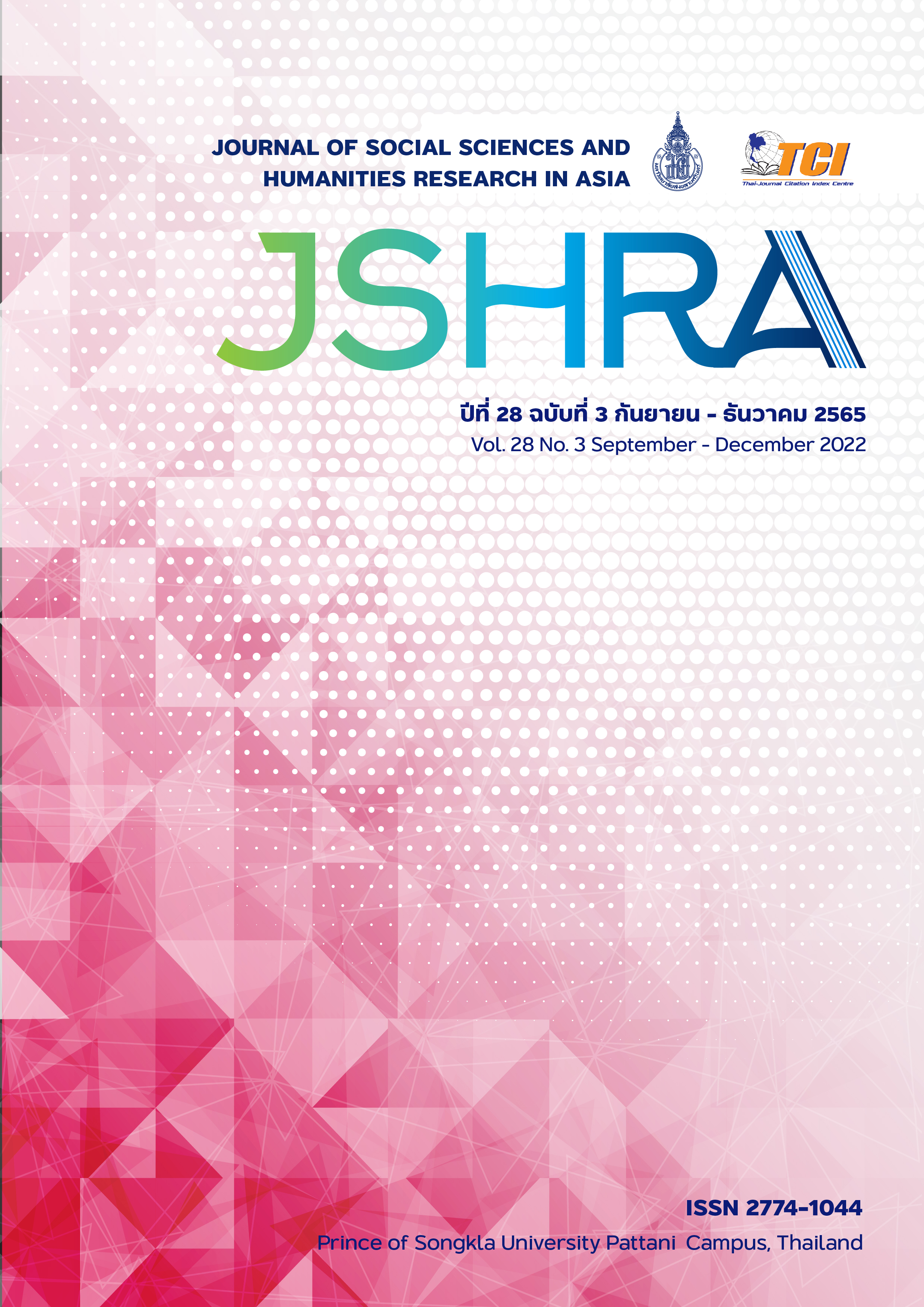Muslim Women: Life and Role as Social Activists in the Southern Border Provinces
Keywords:
Muslim Women, Social Activist , Southern Border ProvinceAbstract
The objectives of this research were; 1) to study ways of life and the social status of Muslim wornen social activists in the three southern border provinces, 2) to study roles of Muslim women as being social activists in the 3 southern border provinces, and, 3) to propose development guidelines for Muslim wornen to be able to play a role as social activist for social development in the 3 southern border provinces. This research was qualitative research. Data were collected by in-depth interviews with Muslim womnen social activists in Pattani, Yala, and Narathiwat as key informants-5 people per area, a total of 15 people, of which those affected by the unrest working to aid others affected. Content analysis was used, and it had shown that most Muslim woren had been active in advocating, mentoring, and helping female victims of domestic violences in which their roles and work processes included helping the victims making petition, on-site assistance for one-on-one advice, accomnmodating by coordinating with relevant organizations, and, among all important roles, calling for gender equality. Common issues found during work were the imbalance of work and famnily care times as a Muslim womnan and not being accepted by people with ingrained beliefs and attitudes in the fact that Muslim women come out as social activists were against Islamic belief. Besides, the victimns having a lack of trust in the social movement network's activists whom tried to reach and help caused our work to be inefficient as it should had been. Based on the findings, it is possible to propose development guidelines for the Muslim women to play a role in social activism with 3 keystones that; relevant organizations must build knowledge and understanding towards social mobilization and try to build knowledge and better attitudes towards self-appreciation for Muslim women; network workflows need to be allocated to align more with Muslim women's ways of lives; and, there should be more approaches and concepts of self-worth being passed on in the society.
References
Arenee (pseudonym). (2021, 10 September). Education Social Activist. Interview.
Ayah (pseudonym). (2021, 10 September). Education Social Activist. Interview.
Beasley, C. (1999). What is Feminism? London: Sage Publications.
Buranarak, W. (2005). People’s political movement: Case study of environmental conservation group, Udon Thani Province (Master of Political Science Degree). Chiang Mai University.
Chaicharoenwattana, B. (2008). A study of policies, measures and approaches to solving the unrest and develop the area of the three southern border provinces (Master of Management). Prince of Songkla University.
Chanrak, P. (2018). Social driving process towards amendment of the Penal Code, section 276 and the creation of discourse on women’s body rights (Master of Arts). Thammasat University.
Department of Women’s Affairs and Family Institute. (2017). Women’s rights. Retrieved January 10, 2022, from http://www.dwf.go.th/
Fineman, A. (2001). The autonomy myth: A theory of dependency. London: The New Press.
Hal-Fauzan, S.F. (2017). Introduced the provisions of especially related to women translated by Arifin Yacharad (Research report). Songkhla: Office for the Propagation and Teaching of Islam, Ar-Rabwah, Riyadh.
Husna (pseudonym). (2021, 10 September). Education Social Activist. Interview.
Khanphon, P. (2007). Appropriate legal measures for the prevention of discrimination against women: A case study of the protection of women’s rights under Thai law in conformity to the convention on the elimination of all forms of discrimination against women (1979) (Thesis for Master of Laws). Ramkhamhaeng University.
Madden, A. (2014). Peace-building process by women in the midst of violence in Asia region, source of support budget. Bangkok: Office of the Research Fund (TRF).
Makasakul, T.N. (2013). A new social movement movement in Thailand. Bangkok: Aksa Samphan.
Makudi, I. (2561). Principles of right and opposite confidence. Bangkok: Sasana Wittaya School.
Moh (pseudonym). (2021, 10 September). Education Social Activist. Interview.
Nana (pseudonym). (2021, 10 September). Domestic violence Social Activist. Interview.
Pindeang, P. (2019). Fundamentals of religion. Bangkok: Mahamakut Wittayalai Printing House.
Public Relations Office, Yala Province. (2020). Three southern border provinces. Retrieved January 10, 2022, from https://pr.prd.go.th/yala/main.php?filename=index
Saida (pseudonym). (2021, 10 September). Social Equality Activist. Interview.
Sainui, S. (2014). Islamic leaders and social movements. Bangkok: Office of the Research Fund.
Samuhsenito, A., Tongsamsi, K., Benrit, P., & Useng, N. (2017). Sexuality in life, marriage of Thai Muslims, Pattani Province. Journal of History, Thammasat, 4(1), 90-115.
Saripah (pseudonym). (2021, 10 September). Domestic Violence Social Activist. Interview.
Somsawad, W.A. (2018). Theist feminist. Chiang Mai: Vanida Press.
Thitiraweewong, P. (2018). Changes in women’s roles in the perspective of Muslim women southern border provinces. Journal of Education, Prince of Songkla University, Pattani Campus, 21(2), 148-161.
Touraine, A. (1998). Critique of modernity. Oxford: Blackwell.
Wantana, S.K. (2014). Contemporary political ideology. Nakhon Pathom: National Agricultural Extension and Training Center.
Wichitwatchararak, S. (2019). Social movements among LGBT people, Thailand. Chulanakorn Journal, 6(4), 10-28.
Wisalaporn, S.M. (2009). Leadership, collection of theory and practice, educational Administration (Research report). Nonthaburi: Sukhothai Thammathirat Open University.
Wainer, H., & Braun, H.I. (1988) Test valiclity. New York: Bedge.
Yoh (pseudonym). (2021, 10 September). Social Equality Activist. Interview.










